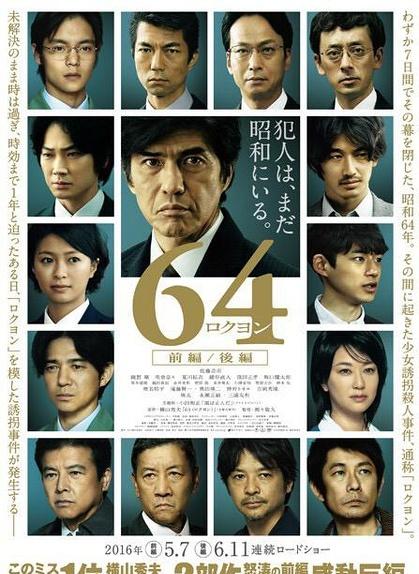
Showa 64 (2016)
Japan
A total of 7 shows were screened at the Festival
The first screening
6-119:00 Great Bright Cinema
Pick up tickets to fill in the gaps
6-13 13:30 Shanghai Cinema (New Hengshan Store)
6-16 13:30 Shanghai Cinema (New Hengshan Store)
"Showa 64" was robbed mad in the upper film, and finally added to seven scenes.
Tomorrow, the end of it will be unveiled.
Will this original suffocating crime epic hit the streets at the premiere of the upper film?
Before discussing this, I would like to give Amway a look at the Japanese drama of the same name, Showa 64.
The sequel to Showa 64 was premiered at the Upper Film Festival
It was almost my final exams recently, but I still couldn't help it, and spent a few hours watching a little bit of the TV series and novel version of "Showa 64" that was so crazy.
Showa 64 existed for only 7 days, and during those 7 days, there was a kidnapping and ticket tearing incident, which was the first time in the history of D Prefecture and the biggest stain on the local police. Mikami was still a criminal police officer at the time, and participated in the investigation of the case as a member of the car that followed the victim's father to pay the ransom. The body of the kidnapped 7-year-old girl was found three days after the ransom was taken.
Fourteen years after Heisei, a new kidnapping case occurred in D Prefecture, and all the elements were exactly the same as those at that time.
From this story, there is basically nothing to be picky about, it is very suitable for changing into a movie, and as long as it is well filmed, it should be able to shoot well.
The five-episode miniseries version of Showa 64 is a spectrum of the main character relationships
It has no mud or complicated reasoning, and it is a suffocating crime epic, with complicated preparation and a climax that can kill in one move. There are also deviations in the perspective of the characters and the plot arrangement, and the pattern presented is very large.
Or rather, it does not want to simply write two intertextual crime stories, but intends to explore the larger social relations contained in the connection of these two crime stories.
The film version of Showa 64 brings together a group of popular stars such as Hiroshi Sato / Tsuyoshi Ayano / Nana Eikura / Yuwa Miura / Masatoshi Nagase, and making such a story is indeed the biggest reason for the madness. With the police as the protagonist, it directs attention to the interior of the police station, exposing the various struggles and games within the police system and between it and the media.
In Japan, the first part (released on 5.7) was released a month earlier than the next part (6.11 premiere), which made its [first part] (the first half) receive more bad reviews - too much preparation, and the content shown was mainly based on workplace disputes, and the touching truth of the case part was hidden.
The first part of "Showa 64" was complained about being slow and wordy
In fact, this may be a relatively new, with a strong socialization, realistic criminal reasoning story content processing, when we shift our attention to the internal struggle of the police station on the edge of these cases, we are actually unconsciously weakening the unreasonable part of the reasoning established under this "trick" and appearing more real. Of course, this effect needs to be released together before the previous and subsequent chapters can be achieved. And this time the version at the Festival is the full version.
But the four-hour film does make people question: what a long-winded version it was made?
After all, TV episodes are only the length of miniseries, and each episode can catch the audience's attention through many plot point settings, and will not be bored in the middle.
In short, I personally still look forward to this work, waiting for its comments tomorrow after its premiere at the Festival.
Past articles